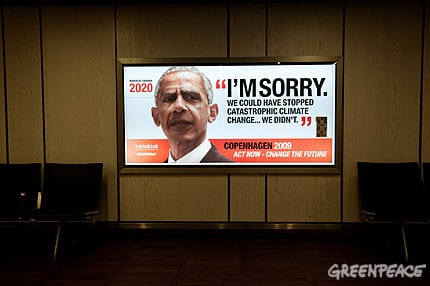There is a darkening sky hanging over Copenhagen.
It’s not that things are looking worse on this first day of the 15th Conference of the Parties to the United Nations Framework Convention on Climate Change – COP15. If anything, there seems to be an unlikely optimism at the sprawling and crowded Bella Centre.
Rather, it’s just Denmark in December. This is a northern capital – at a higher latitutde than Moscow, not quite so high as the Canadian tar sands capital of Fort McMurray. The city enjoys a scant seven hours of daylight at this time of year, an amount that will continue to diminish for the duration of the conference.
Of course the question, at this dark hour, is whether it will be followed by a new dawn. Organizers would like you to think so.
For the determinedly optimistic view, the newly elected COP president and Danish COP15 Minister Connie Hedegaard kicked off the cautious cheering: “We have reached the deadline and there is no going back. Copenhagen will be the city of the three C’s: ‘Cooperation’, Commitment’ and ‘Consensus’. Now is the time to capture the moment and conclude a truly ambitious global deal. This is our chance. If we miss this opportunity, we will not get a better one.”
Dr. Rajendra Pachauri, Chair of the UN Intergovernmental Panel on Climate Change, also tried to sound bullish on the podium, but he was more restrained on the subway earlier in the day. (You have to like UN officials at this level who would have the modesty to actually take the subway.) Asked directly about whether the COP could come to a useful conclusion, he said, “I am mildly, but not wildly optimistic.”
Pachauri deserves credit for maintaining any optimism whatever, given that he felt compelled to spend part of his opening statement defending the quality of science that has marked the IPCC process. It is as if the emails stolen from the University of East Anglia were actually lying around in the room, smoking. At least, they were invoked again and again, raised in press conferences and, as in Pachauri’s statement, referred to directly or obliquely in virtually every session.
The reliably unreliable Christopher Monckton was also in evidence, wandering about, pestering those journalists who are still willing to add “balance” to a story of epic human irresponsibility. Monckton, who was also a special guest at the denial conference staged in the Danish Parliament Sunday, was overheard claiming, again, that the very concern about climate change is overblown, a position he says is confirmed by the stolen emails.
It was, perhaps, not a surprise that Canada’s bloated profile caught everyone’s attention on the first day, as well. Prime Minister Stephen Harper was sending mixed messages while travelling in Asia, calling for a “binding agreement,” while suggesting that his was disinclined to do anything at all about the environment until the world economy improved.
In Copenhaggen, Harper’s Chief Negotiator Michael Martin tried to strike an optimistic tone, but reiterated Canada’s intention to stick – under every circumstance – to its target of reducing greenhouse gases just three per cent from 1990 levels by 2020. For his flexibility, he won Canada the first Fossil of the Day award – fr refusing, on the first day of a negotiation, to actually negotiate.
So, the day began pretty much as predicted – forced optimism, guarded skepticism and a slim hope that somehow the coming of U.S. President Barack Obama might change everything, even though we know it cannot. Thanks to TckTckTck and Greenpeace’s aggressive airport advertising, all visitors to Copenhagen are greeted by the above image of an imagined older Obama, apologizing to the world for the failure of the world’s government’s to have taken the necessary action to address climate change.
The point, of course, is to encourage Obama and the other leaders to prove them wrong. We need wait only two weeks to find out whether that will be the case. Come the winter solstice, we’ll know whether the will be more light on the environmental horizon to match the gtoo-gradual return of sunlight in the Danish sky.
Subscribe to our newsletter
Stay up to date with DeSmog news and alerts






